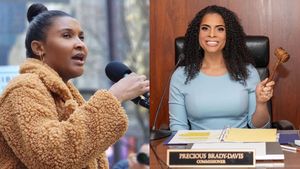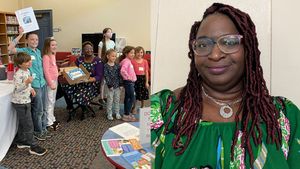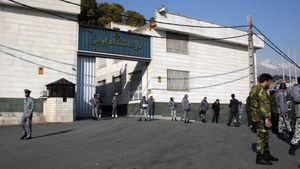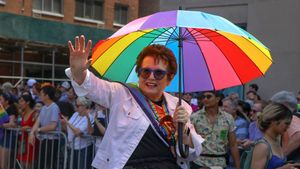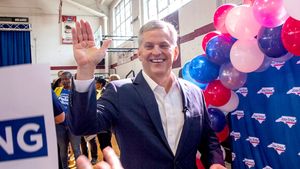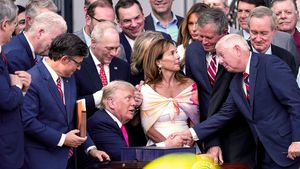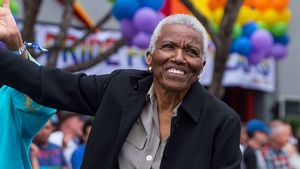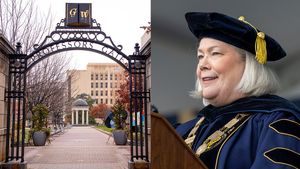In the introduction to Far & Away, a collection of his journalism, Andrew Solomon recalls a childhood conversation with his father in which the subject turns to the Nazis and the Holocaust. Solomon, who was 7 at the time, was horrified. Why didn't the Jews of Europe leave when things got bad? "They had nowhere to go," his father replied. It was a crystallizing moment. From that day forward, Solomon understood two things very clearly: Absolute safety was an illusion, and he would make sure he always had somewhere to go. "I would never suppose that just because things had always been fine, they would continue to be fine," he writes. "I would leave before the walls closed around the ghetto, before the train tracks were completed, before the borders were sealed."
Solomon wrote that in late 2015, when the question of how to respond in the face of tyranny was merely a hypothetical exercise. But since November 8 of last year, it has seemed a lot less hypothetical. "I've talked to German Jews who describe thinking, But we're so well incorporated in this society it couldn't happen here," he told me in February, as we sat in the outlandish splendor of New York's Russian Tea Room drinking Moscow Mules. "I just feel the liability is bigger than a lot of people let on, and I think there's a responsibility to do everything you can to prevent the horror."
It was a Monday evening and the restaurant seemed empty. Juxtaposed with the rococo decor and plush red upholstery, the urgency of our conversation felt faintly absurd, but Solomon, who is also president of PEN American Center, has no patience for complacency. He reflected on a trip he made to Afghanistan for a 2002 article for The New York Times. A friend in Kabul showed him photos from the 1960s in which Afghan women sported miniskirts. Although the Taliban was vanquished, women continued to wear their burqas, justly skeptical that their newly restored freedoms would hold. After all, what is done can always be undone.
Likewise, gay men in America who enjoyed growing acceptance in the 1970s only to experience the social isolation wrought by AIDS in the 1980s know as well as anyone that progress doesn't travel in a straight line. For a long time, Solomon felt insulated from his worst fears by having both British and American citizenship, but post-Brexit the appeal of moving to the U.K. has curdled. His grandfather was born in Romania, and he had explored that option, too. "I have a good friend who used to be the minister of culture in Romania," he said. "So I called her and she said, 'Oh, I'll find you a lawyer, and if you go through with it you have to learn to sing a hymn in Romanian.'" Although that's the kind of challenge that Solomon would approach with gusto, Romanian citizenship is clearly the option of
last resort.
--
When I first read Far & Away, in March 2016, the anxieties that animated us at the Russian Tea Room were still in the future. Solomon's essays felt like a eulogy to the joys of travel and the carnival of life, and it seemed apt for us to meet at New York's Metropolitan Museum for a globe-trotting tour of his favorite exhibits. It was spring break, and the galleries were crowded with children. As we muscled our way through the Egyptian rooms, and past the Temple of Dendur, Solomon reminisced on his own youth interning at the museum. "I was hired as the unicorn for a medieval festival at the Cloisters," he recalled. "I wore an absolutely ludicrous costume with a long horn and had to stand by a wishing well and bless passing virgins." Solomon, who is tall and dresses with the flair of an Edwardian dandy, chuckled at the memory. By his own admission he was an unusual child, and not much liked at school. He loved opera and was a reluctant athlete. When he was in fourth grade, his parents took him to see a psychiatrist. "Afterwards the shrink said to my mother, 'Well, he doesn't seem very good relating to other children, but he's very good at relating to adults, and in about 10 years the other children will be adults, so that will be fine.' "
This is more or less exactly what happened. A few years ago Solomon went to a high school reunion to mark the 25th anniversary of graduation, and was delighted to discover that he no longer cared for the opinion of his classmates who seemed to live in a closed circle of expectations. Their children were destined to go to the same good school and the same colleges in order to get the jobs that would enable them to live in the same nice houses. On it would go, down the generations. For all its attendant trauma, Solomon saw clearly that being gay had freed him from the claustrophobia of a world where there is only one way of doing things. Likewise, his childhood trips to the Metropolitan with his grandmother were journeys into other realms. A landscape painting from, say, China's Qing Dynasty could speak to his desire for escape as powerfully as C.S. Lewis's The Lion, the Witch, and the Wardrobe. "I always liked the sense that you get lost in these paintings," he said, pausing in the Asian galleries and pointing to an exotic scene of mountains rendered in pale ink wash. "I felt somehow as though I could get in there and disappear behind that piece of it."
In many ways, of course, travel is a kind of disappearing act too, a way to move beyond the familiar. Like many gay men before him, Solomon found a liberating freedom in travel that enabled him to be fully himself. He came out in England rather than New York, where he always felt "sucked back into a vortex of expectations and assumptions." In travel, Solomon discovered he could be whomever he wanted. When you have supped with Russian artists who survived Siberian exile, when you have danced exuberantly amid the bombed-out ruins of Kabul to music banned by the Taliban, and when you have found yourself in a Senegalese village buck naked and covered in the blood of a freshly slaughtered ram as part of a Shamanistic treatment for depression, you come to realize that the ways of the world are many and varied. The conventions and etiquette that were instilled growing up on the Upper East Side of Manhattan cease to matter.
Most of the stories in Far & Away work precisely because of Solomon's boundless curiosity and his ability to check his prejudices. His immersion in his reporting is total. In Russia, in particular, he became a familiar presence among the artists he was documenting, culminating in a dramatic night in 1991, known as the August Coup, when members of the government attempted to oust the reforming Soviet leader, Mikhail Gorbachev. Solomon joined his artist friends in creating a human blockade between the tanks and the Parliament, a seminal moment in Russia's modern history. The coup failed, and Solomon soon returned home, invigorated and transformed.

"I remember thinking, They're all just willing to risk their lives for this ideal of freedom," he said. "Am I willing to risk my life for an ideal of freedom? I wanted so much to have something I cared about that much."
For Solomon that "something" was a family of his own. Although his mother struggled when he came out, he grew up viewing his home as a safe space where his eccentricities were loved and not rejected. "I had this idea that my parents would get old and die, and that if I hadn't made another family of my own I'd be adrift in the world in some way," he said. His foreboding was borne out in his 20s, when his mother was diagnosed with ovarian cancer, leading to her death a few years later. Crippled with grief, Solomon found himself sliding into severe depression that made him fearful and anxious. He would be driving along the highway and find that he no longer knew how to drive, for example, or would struggle to remember how to operate the shower. In his monumental study of depression, The Noonday Demon, for which he was a Pulitzer Prize finalist, Solomon recalled a singular episode, shortly after publishing The Stone Boat, a bildungsroman about the illness and death of a mother and the coming out of her son. He was returning home from a book party organized by friends when he lost control of his bowels, the beginning of a near total collapse. A day later he could barely talk. He described the feeling as akin to that moment of terror as you trip or slip, except that Solomon had that sensation "hour after hour after hour."
In the strange manner of these things, depression would lead Solomon to John Habich, whom he met in Minneapolis in 2001 during a tour to promote The Noonday Demon. Habich was interviewing Solomon for the Minneapolis Star Tribune, and the two fell in love, cemented a few months later by the September 11 attacks. "I wanted to get out of lower Manhattan," said Solomon. "I didn't believe the air wasn't full of horrible things, which of course turned out to be right." To escape he moved in temporarily with Habich, catapulting them into early-onset domesticity. Their wedding, in 2007, took place in Princess Diana's childhood home, Althorp, in England. Solomon wore an Asian tunic made of 19th-century salmon-colored silk fabric.
They now have children of their own -- a daughter, Blaine, who lives with her biological mother in Texas, and a son, George, who lives with them in Manhattan.

Through George, in particular, Solomon finds himself reliving the pangs and joys of childhood afresh. Some years ago, on a beach outing, the two climbed up a stand to view turtles. "We turned around to come back down, and I said, 'George, you have to hold my hand, because these steps are very steep.' We came down three of the steps and then we slipped, and I slid all the way down, pulling him after me." Although he was injured and needed stitches, what Solomon recalls most vividly is seeing George's head trapped in the space between the banisters. "I remember feeling, so acutely, that I didn't care if I'd broken my back as long as I hadn't injured my son." In George, he'd found the cause he'd risk his life for.
We were walking through the Egyptian galleries, when Solomon pointed to a vessel made of red clay and sprouting two human feet. "The bowl with the feet," he announced. "I remember being very charmed by that." We peered at the ancient object. "It looks just like it's stepping forward," he said, grinning. Lately he had been enjoying seeing which parts of George were like him and which parts were not. George also happens to like the bowl with feet, but he also likes Pokemon cards. "He is much more interested in the common currency of childhood than I was," Solomon said, adding sadly, "He doesn't really like Winnie-the-Pooh."
Solomon's experiences as a gay child and then as a gay parent would send him on another journey, this time to write Far From the Tree, in which he explored the experiences of children marginalized by differences they don't share with their parents. He called these "horizontal identities," and they included deafness, dwarfism, schizophrenia, autism, child prodigy status, homosexuality, and transgenderism. Although he wrote the book, which was published in 2012, as a tribute to resilience and love, its embrace of difference feels more relevant than ever. When he delivered a lecture in Wisconsin recently, he felt compelled to warn the university that it might get heated. "I can no longer talk about its model of an embracing, inclusive society without lapsing into at least implicit politics," he said.

--
When I meet Solomon again in New York's Russian Tea Room, almost a year has passed, and Far & Away has been updated for the paperback edition to accommodate the seismic political events of 2016. What had read as an ode to the humanizing value of travel is now a passionate cri de couer to resist the nativist impulses that seem to be sending America lurching into a new Dark Age. The victories of both Trump and the Leave campaign that led to Brexit were attempts to reject the way things are for the ways they used to be, Solomon argues. In both countries, the immediate effect was a sharp increase in hostility against minorities. Although published last spring, when Trump's run for president still seemed like a crude comedy sketch overstaying its welcome, Far & Away turns out to have been remarkably prescient about the nationalist sentiments now emanating from the White House.
"Quarantining otherness breeds in those others an ignorance of us that engenders hatred, which soon becomes dangerous," wrote Solomon. "It awakens an equally dangerous hatred in us." Circling the wagons, he argued, was not only impossible in a global world but perilous. Yet circling the wagons is exactly what the Trump administration is now doing.
There is a wonderful moment in Mongolia, when Solomon, on assignment for Travel & Leisure, meets a camel herder in the Gobi Desert. It is 1999, when nomadism is still a dominant way of life there (it has since begun to change), and the herder describes the feeling of exhilaration at being able to move his house and flock wherever he chooses, before asking, "Tell me, is America also a free country?" Time and again, Solomon in his travels overseas is left to ponder the assumed freedoms and privileges of being American. If those questions felt like an academic exercise when he was putting the book together, they no longer do. A spike in anti-Semitic attacks and the Trump administration's anti-Muslim rhetoric and assault on transgender rights have made old certainties feel suddenly tenuous, fragile. "I don't think my life here is at risk, but I feel my way of life is at risk," Solomon says. "I don't mean the house I live in, or the clothes I wear, but the basic understanding of the world order and the belief that all that is beautiful can continue for the more or less indefinite future." For someone who has spent his life studying and celebrating otherness, these are unhappy times. Solomon has experienced some truly wretched places, including Gaddafi's Libya, where he says a month felt like a decade, but the essays in Far & Away were written primarily out of a sense of adventure.
"It was very serious, but it was also a game," he says. "It doesn't feel like a game here -- it feels like it has an impassioning urgency."
Far & Away: How Travel Can Change the World is available in paperback on May 23 from Scribner
Like what you see here? Subscribe and be the first to receive the latest issue of Out. Subscribe to print here and receive a complimentary digital subscription.






























